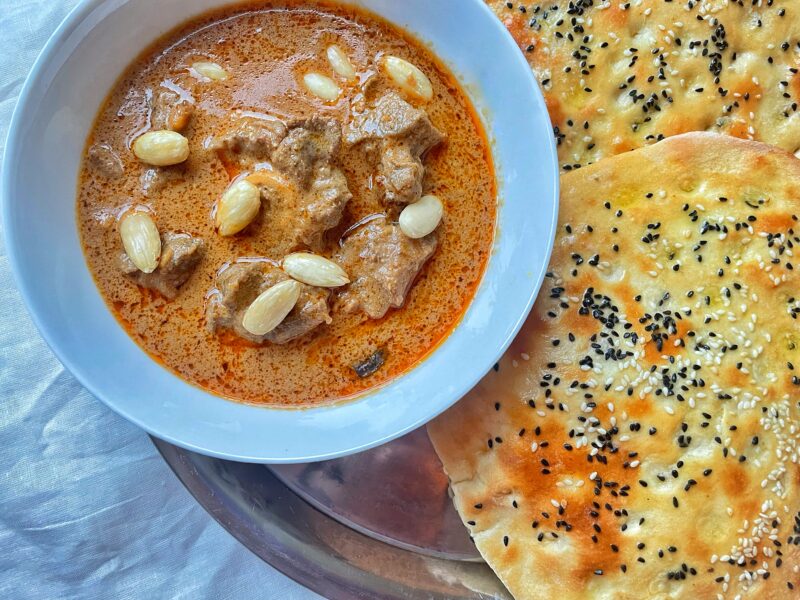In my humble opinion, mutton korma wins over chicken korma any day because the extra long cook time means all the flavours infuse into the meat more, the flavours become richer and more intense and everything melds together so so deeply. This is an authentic, real deal mutton korma recipe. I’ve used the traditional technique and proper spices which come together to make that authentic, asli zaiqa of a korma I am certain you will love.
🤩 What makes a delicious mutton korma?
Using an excellent, fresh cut of mutton is imperative. The freshness of the meat will have a huge impact on how good the curry is. Mutton that isn’t in great condition will have an odour that no amount of frying will get rid of and it just won’t taste so good. My best tip for ensuring you get the best, fresh cuts of meat is getting on good terms with your butcher and quite frankly just asking them to let you know when they’ll be getting new stock. Fried onions are a non-negotiable for me. Traditional, authentic kormas require you to thinly slice and fry your onions until they’re a deep golden brown, then set them aside to allow them to crisp up, and then crush them and add them into the curry towards the end of the cook time. My recipe does this too
Lots of aromatic whole spices such as cloves, cardamom and bay leaf A rich, luxurious sauce. Mine is made using a combination of full-fat yogurt and cashews Any good Pakistani or Indian style korma does have a heavy hand on the oil - it’s just the nature of the devil. Having said that, I have made an effort to keep the oil as minimal as possible while still getting that korma feel and look. You are free to reduce the oil if yo so wish
🔪 Method
We’re going to start off by frying up some beautifully thin sliced onions in some oil, stirring often over a medium heat until they turn a deep golden brown. Proceed to take them out using a slotted spoon, then set them aside spread them out over a large plate or tray on top of a tissue paper. We’ll come back to them later. In the same oil as you fried the onions in, add the mutton, ginger, garlic and spices (cloves, black cardamom, green cardamom, bay leaf, black peppercorns, cinnamon, coriander powder, cumin powder, chilli powder/deghi mirch and salt) and keep frying everything until the mutton no longer remains pink. Once the mutton is no longer pink, add in the yogurt and pureed cashews. Fry everything over a high heat, stirring constantly. The yogurt and cashews will slowly concentrate down into a thick sauce. Once the sauce has thickened down substantially and you can see the oil separating around the edges, add in about 900mls of water. Bring it to a boil, then cover and simmer on low for 1.5-2 hours, until the mutton is tender. Check on the korma a few times during this cook time, stirring. Towards the end of the cook time, go back to the fried onions we had set aside. They’ll be crispy now - we’re going to crush them either using a pestle and mortar or our hands. The key here is to not allow them to turn into a smooth paste, but to keep some texture, which is why we don’t grind them in a food processor. Once the cook time is up, take off the lid and add in the crushed fried onions. Stir in, then place the lid back on and allow everything to simmer for a further 5-10 minutes. You can add some more water in at this point if you feel like the korma isn’t soupy enough. Stir in kewra water, and our mutton korma is ready! Garnish with blanched almonds and serve hot.
🥜 Substitutes for cashews
If you don’t have cashews to hand or don’t want to use them, there are alternatives too! I do highly recommend cashews though - they add a very specific sort of flavour which really complements this recipe really well. You can instead use one of the following:
blanched almonds 2 tablespoon of full fat yogurt 2tbsp of coconut milk 2tbsp of double cream
🥩 Using a different meat
Lamb: The only change you’ll need to make is to reduce the cook time to 1hr 15 minutes and add roughly 600-700ml (2.5 cups) of water. Beef: Double the cook time and water added Chicken: follow this recipe
🍽️ How to serve
Mutton korma goes best with Naan (may I recommend my Roghni Naan?), sheermaal or taftaan. Sheermaal is readily available at Desi superstores in the frozen section if you live outside of Pakistan or India.
📋 Recipe
Enter your email & I’ll send it right over. Plus, you’ll get bonus Pakistani food-goodness from Fatima Cooks, like new recipe alerts, exclusive email-only recipes + more! By submitting this form, you consent to receive emails from me. Your details are secure. Opt-out any time.











